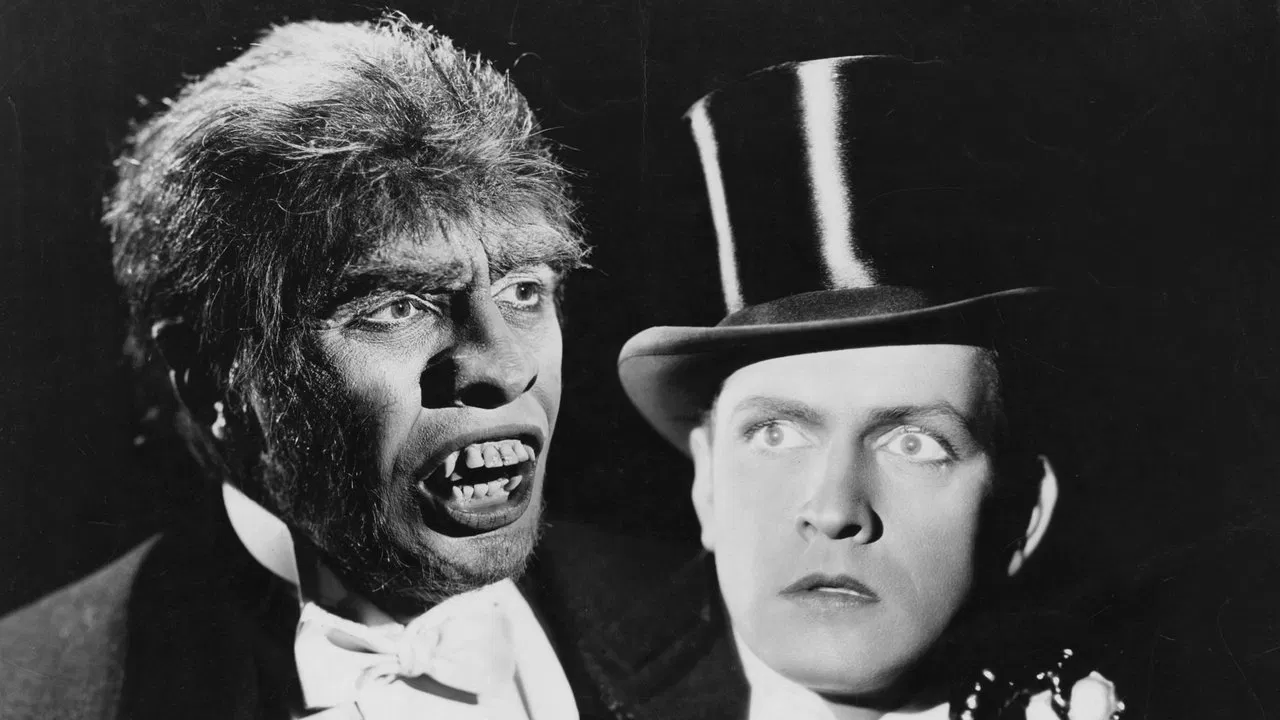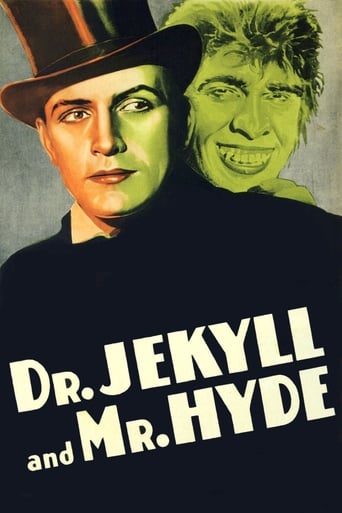

Nowadays it is extremely fashionable for critics to praise Mamoulian's version at the expense of Fleming's. After all, Mamoulian has a much higher status as an auteur than Fleming. Why? Fleming died in 1947 whereas Mamoulian was attending retrospectives and giving interviews well into the 1970s. Furthermore, his comparatively small body of work — 16 films over a 28-year period — makes the job of researching so much easier, leading to a proliferation of articles, theses and career studies. In addition, the 1931 version has attained a cult status due its purchase and subsequent suppression by MGM. (And no wonder they hid it away. Although Mahin receives sole screen credit, not only the adaptation — with its introduction of the Ivy character who is not present in Stevenson's line-up — but many of the scenes themselves are a direct steal.Despite the similarities, Mamoulian's is really a somewhat different film, looking at Hyde from a less moralistic angle. His direction is much more showy than Fleming's with its imaginative first-person camera and ingenious slow wipes. Both films have the benefit of no- expense-spared period sets and marvelously atmospheric photography.March's Hyde with its grotesque make-up and spell-binding special effects is one of the highlights of 30s cinema. The actor won an Academy Award for his performance, but deserved it more for his projection of the incarnately evil Hyde than his portrayal of the somewhat simpering Jekyll. Tracy's Hyde has an equally fascinating malevolence, but his Jekyll is much more forthright and believable. And despite the technical brilliance of March's transformation (compared to the obvious if increasingly skilled use of superimposition for Tracy's), the climactic scenes in the Fleming film are more effectively handled and set. (The climax starts about three-quarters of the way through when the transformation unexpectedly takes place of its own accord. Hyde suddenly becomes the dominant personality, taking refuge in Jekyll primarily to escape detection. The Mamoulian climax starts with Jekyll sitting on a park bench, listening to a nightingale and quoting Keats while a black cat stealthily advances on her prey — an effective metaphor, but Fleming's is even more vivid: Tracy goes whistling off in the fog to his engagement party. He disappears into the mist. The whistling continues jauntily, hesitates and stops. Cut to a close-up of Tracy, slightly bewildered. He starts off again, once more sauntering gaily into the fog, but this time he is whistling not the Lana Turner theme but "See Me Dance the Polka".) Not only is Tracy more than a fair match for March, but producer Fleming has surrounded him with an absolutely first-rate support cast. Ingrid Bergman's remarkably luminous yet sexually provocative performance (this was her 4th American film, following Intermezzo, Adam Had Four Sons and Rage In Heaven. Her next film was Casablanca) far outshines Miriam Hopkins'. Of course, we expect a skilfully charming performance from Ingrid. What is even more of a surprise is the appealing conviction Lana Turner brings to the heroine. (Oddly enough the roles were originally reversed, but Bergman persuaded Fleming to let her try her hand at a "bad girl".)Ian Hunter is perfectly cast as the stolid Lanyon (yet so much more personable than Holmes Herbert in the Mamoulian version), while Peter Godfrey brings a lively yet sensitive spirit to Poole. Donald Crisp purrs his usual warm authority into Sir Charles and there are some delightfully animated character cameos from both upper (Lawrence Grant's indignant Dr Courtland, Aubrey Smith's smooth- tongued bishop) and lower (Billy Bevan's talkative park attendant, Alec Craig's inflexible waiter, Forrester Harvey's mendacious manager) classes. While not as showy as Mamoulian's, Victor Fleming's direction is equally as sophisticated, using a great variety of effective camera angles and dramatic compositions, allied with a superb sense of atmosphere and a masterful knowledge of pace and movement. Right from its opening credits to its fade-out 127 minutes later, the narrative grips like the proverbial vice, no matter how familiar you are with the story or how many times you've seen the film before. The credit for this mounting excitement and suspense must be shared with the players, the writers, and the other technicians. Tracy never gave a more electrifying performance. His Hyde is achieved with comparatively little make-up (compared to March's), the menace conveyed primarily through a change in voice and demeanor. Mahin has supplied him with some fascinatingly malicious dialogue. Even when stealing scenes direct from Heath and Hoffenstein, he usually improves them. For example, Tracy's famous line, "Even as Hyde I warned you", is missing from Mamoulian, leaving March's motive in warning Lanyon completely unexplained.(As noted above, both scripts have been considerably fleshed out from Stevenson's original novel, while retaining much of its flavor and many of its ideas — principally that Jekyll's vice is from the very first a deliberate assent — rare themes indeed for Hollywood, especially i
... View More"Dr. Jekyll and Mr. Hyde" from 1931, is the undisputed version of the short story from Robert Louis Stevenson. Only the John Barrymore version comes close. For sheer storytelling, direction, acting, make-up techniques and suspense - the 1931 film is in a class of its own. In the main roles, Frederic March is one of the few actors to win an Oscar for Best Actor in a horror film. It is rather seldom for an actor to even be nominated, let alone win.There was a good deal of censorship with this film, which is why there was a delay in its release. For years, the only version available was the one that ran for 80 minutes. Some of the slightly sadistic scenes between Hyde and Ivy were either trimmed or censored altogether. Most of these have been restored. Also, scenes shot of a child being trampled underfoot by Hyde were removed (a damn good thing as well).On DVD, this masterpiece can be enjoyed at its full length of 91 minutes.
... View MoreThis is the best 1931 version I have ever seen. The storyline was so well, the camera work was brilliant, you honestly felt like you were the character looking at other characters. Although you do kinds get creeper out by Hyde. I was astonished that rape was involved so early in an old time movie like this. I can understand it's horror but it just was so unexpected and frightening! I really applaud Fredric March for playing two characters throughout the whole movie. It was quite shocking that he was hospitalized after involving in this film. The reason could be the makeup whenever he had to play Hyde since it did report that his face was sort of disfigured. He was such an excellent actor and I'm only discovering him years later lol! This movie definitely deserved an Oscar, why can't Hollywood just leave it alone and not do too many adaptations?! I know it was also adapted in 1920 but still, it's not great to leave this Hollywood gem out of the movie lot!
... View MoreOne of the creepiest older sci-fi horror films ever made. Fredric March's performance as Jekyll/Hyde was superb. This is one of those films where most of the horror is subtle - the idea of this looking hideous man-creature Mr. Hyde on the loose.The story is, in it's way, similar to 'The Invisible Man' and 'Frankenstein' because we have a scientist that is considered to be insane for creating monsters yet their intentions started out good.Dr. Jekyll's beliefs in the good man vs the evil man lead him to experiment with the concept. By doing so, he created the strong, primitive Mr. Hyde. Dr. Jekyll represents the brain and the good side of man while Mr. Hyde represents the brawn and the evil.I love these older horror films - they are still some of the best, most creative movies ever made.10/10
... View More